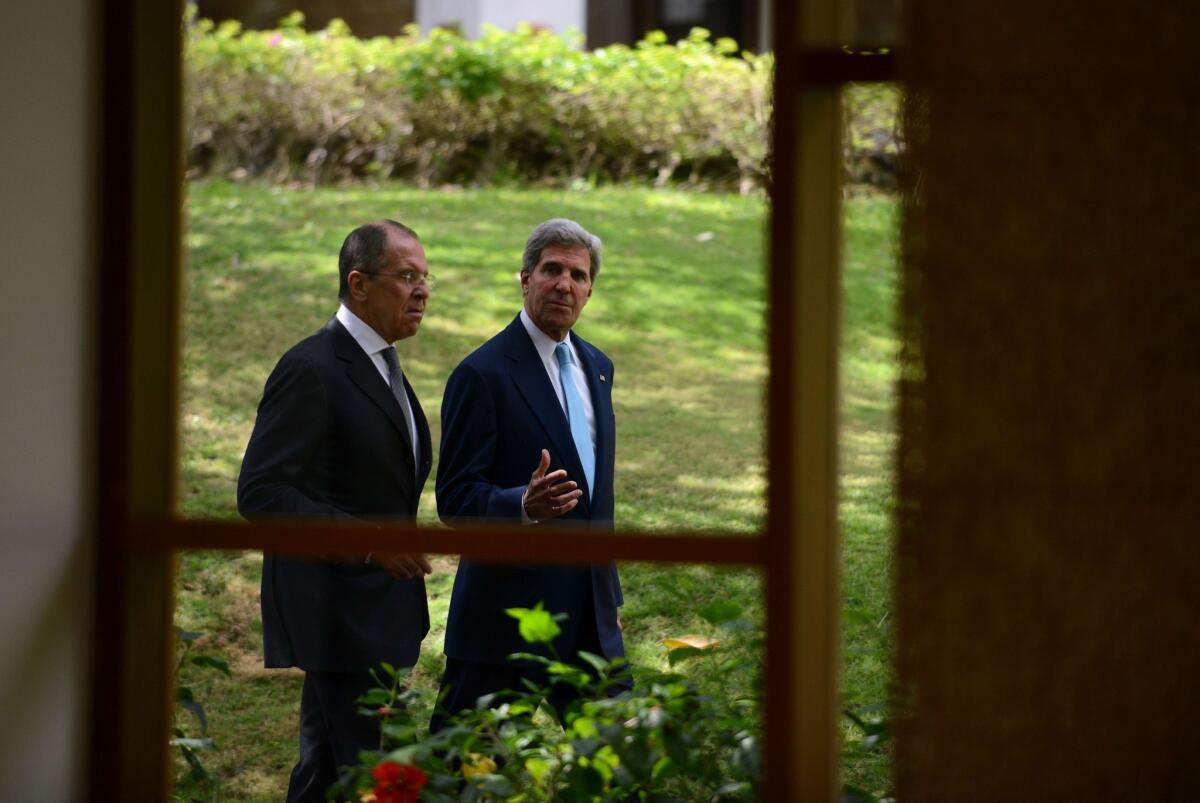Kerry offers rare, qualified praise of Syria’s Assad

BEIRUT -- U.S. Secretary of State John F. Kerry offered qualified praise Monday for the government of Syrian President Bashar Assad, crediting Syrian authorities for cooperating with a United Nations mandate to destroy the nation’s stockpiles of chemical weapons.
In comments in Bali, where he is attending an international economic summit, Kerry said U.S. authorities were “very pleased” at progress in the chemical weapons disarmament plan, calling it “a terrific example of global cooperation,” according to a State Department transcript of Kerry’s remarks.
The top U.S. diplomat singled out Assad’s government for its collaboration with international inspectors now on the ground in Syria and working to carry out the ambitious disarmament blueprint.
“I think it is also credit to the Assad regime for complying rapidly as they are supposed to,” Kerry said at a joint news conference with Russian Foreign Minister Sergei Lavrov, whose government helped craft the Syrian chemical disarmament plan, averting threatened U.S. airstrikes against Syria. “Now, we hope that will continue. I’m not going to vouch today for what happens months down the road. But it is a good beginning and we should welcome a good beginning.”
It was a rare note of U.S. praise for Assad, however equivocal. The United States is aiding rebels fighting to oust Assad, and President Obama has publicly called for the Syrian president to step down.
But the chemical weapons destruction plan, and the continued disarray in the opposition ranks, may have provided Assad with some political breathing room. Kerry’s comments on Monday underscored the importance of Assad’s cooperation in the complex chemical disarmament effort, which is scheduled to continue until at least mid-2014.
On Sunday, the U.N. announced that the destruction of Syria’s chemical weapons stockpiles had begun.
Under the U.N. mandate, Syria’s chemical weapons would be eliminated by the middle of next year, an accelerated schedule that experts have called unprecedented, considering that a civil war is raging in the country.
On the ground in Syria, the more than 2-year-old conflict has failed to oust Assad, whose military has achieved some battlefield successes in recent months, helping to secure the capital, Damascus, and parts of the strategic central province of Homs.
Meanwhile, the presence of Islamist extremists in the fragmented rebel ranks, including Al Qaeda-linked fighters, has likely helped consolidate Assad’s support among some core Syrian constituencies, including minorities and the urban elite.
Officials of the United States and Russia have voiced the hope that a Syrian peace conference could be convened in Geneva by mid-November, but no plans for such a meeting have been finalized. Russia is a major ally of the Assad government.
U.S.-backed Syrian opposition factions have insisted that Assad must agree to leave office as part of any peace talks. Damascus has said it is willing to participate in a peace conference but will not accept preconditions calling for Assad to step down.
In recent weeks, Assad has gone on a publicity blitz of sorts, granting interviews to various global media outlets. Among other points, Assad has told foreign interviewers that he may consider running for election next year, when his current term expires.
ALSO:
2 Americans, German win Nobel medicine prize
Under U.N. eye, destruction of Syrian chemical weapons begins
U.S. raids on Al Qaeda operatives show shift away from drone strikes
patrick.mcdonnell@latimes.com
More to Read
Sign up for Essential California
The most important California stories and recommendations in your inbox every morning.
You may occasionally receive promotional content from the Los Angeles Times.








